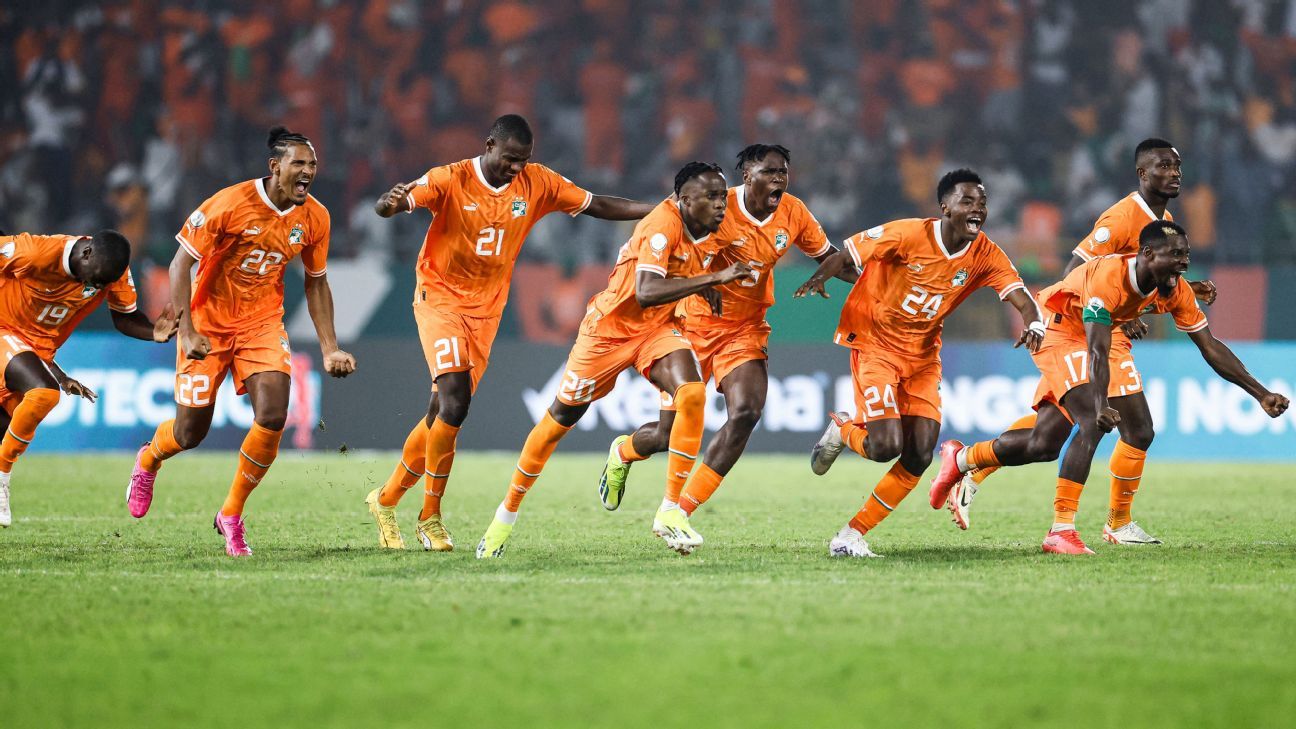Only four matches into Ivory Coast's remarkable Africa Cup of Nations (AFCON) campaign and it's hard to know which is the most-astonishing element of this unprecedented rollercoaster run on home soil. A case can be made that this team's showing can already be considered among the most confounding performances by any side in a major international tournament, such have been the nature of the twists and turns.
The Elephants, hosts at the 34th edition of Africa's premier football competition, have been both extinguished and exalted in the space of a few days, and as they approach Saturday's quarterfinal with Mali, they appear simultaneously on the brink of glorious triumph and plunging back into disaster.
After a win and a draw in their opening two matches -- against Guinea-Bissau and Nigeria-- Ivory Coast's campaign took its first major unforeseen swerve when the Elephants were demolished 4-0 at home by Equatorial Guinea on Jan. 22.
- Stream on ESPN+: LaLiga, Bundesliga, more (U.S.)
For context, it was the their biggest-ever home defeat, worst-ever loss at the AFCON, first beating by a team as low as 88th in the FIFA World Rankings, and the first time they've lost twice in the Nations Cup group stage in over 20 years. It was the joint-second highest losing margin in the tournament's history, and Ivory Coast have only tasted a bigger loss in an international fixture once before.
There was also the stunning nature of the defeat, as the West Africans unravelled during 13 second-half minutes -- conceding three goals -- before being barracked by their own supports amidst scenes of civil unrest as they departed the pitch.
It took the hosts to the brink of a first-round exit - which would have been only the fifth time in history the host nation fell at the first hurdle -- and required a specific combination of results in other groups for them to progress as one of the four "lucky losers" among the third-placed teams.
Their record of three points and -3 goal difference after the group stage would not have been good enough to have advanced in any of the previous AFCON tournaments, but perhaps the only thing (at the time) more shocking that the Ivorians being humbled by Equatorial Guinea, was that they survived.
Breaking historical precedent, the Elephants progressed, with Morocco's victory over Zambia and Ghana's own staggering late collapse against Mozambique (the Black Stars led 2-0 with 91 minutes played before capitulating) seeing them through as the fourth-ranked third-placed team.
EDITOR'S PICKS

Africa Cup of Nations bracket, results and fixtures schedule
6hESPN
Near-naked journalist provokes CAF clampdown
1dEd Dove
The Big Interview - Troost-Ekong on Nigeria's chances, and nearly retiring
3dColin Udoh
While the players celebrated their unlikely progression -- licking their wounds after the public disaster against Equatorial Guinea -- head coach Jean-Louis Gasset wasn't around to enjoy the turnaround, having been sacked on the same day that the Elephants would ultimately learn that their hopes hadn't been entirely extinguished.
A team sacking their coach midway through a tournament is a rarity indeed in international football -- Tunisia's Henryk Kasperczak at the 1998 World Cup being one outlying example -- let alone parting ways on the day that the side progresses to the knockout stages. Yet Gasset, in the face of ongoing discontent from media and supporters alike, was sent packing, and in his stead came Emerse Fae on an interim basis.
A member of the country's vaulted Golden Generation, Fae had a solid playing career in England and France but had absolutely no experience of managing a first team when he was handed the reins in such difficult circumstances.
It didn't seem like the Ivorian Federation were even convinced themselves with their choice of new head coach, and promptly launched a bizarre mid-tournament attempt to nab Herve Renard from the France women's team by requesting the Frenchman's services on loan for the course of the AFCON. The French Football Federation politely declined that request. As if things weren't complicated enough, lying in wait next for the Ivorians were reigning champions Senegal. Had the Elephants survived the post-group stage cull only to set themselves up for an even more sizeable defeat against a team who had looked the strongest of all contenders during the opening round?
While Senegal's AFCON-winning head coach Aliou Cisse had enjoyed almost 95 months at the helm of the Teranga Lions, by the time of Monday's round-of-16 match Fae was overseeing his first ever game as a head coach. Let that sink in.
"This resurrection, this qualification, was a bit of a long shot," the newly appointed interim head coach said ahead of the match. "God has given us a second chance, so now we have an obligation to give our everything."
African football is capricious and inconsistent, and this tournament -- lauded for its shocks and surprises -- has taken the continent's reputation for unpredictability to a new level. Nonetheless, the Elephants' victory on penalties following a 1-1 draw -- Franck Kessiélevelling from the penalty four minutes from time after Habib Diallo had tucked the reigning champions into a 1-0 lead -- was still the next major swerve in their most-remarkable campaign. This was zeroes to heroes in an instant, with the continent's darkest day (vs. Equatorial Guinea) and their brightest hour since 2015 only separated by seven heady days.

Was it too hyperbolic to talk of a miracle? Has there ever been a tournament campaign by an international team in history that has so married triumph and disaster ... with a managerial dismissal thrown in for good measure?
Of course, we've seen disaster at a World Cup before -- France in 2002, France in 2010, Brazil in 2014, Italy in 2010, even Argentina in 2002 -- but all of these kept hold of their manager until the tournament's end.
Brazil's 7-1 semifinal loss against Germany in 2014 -- like the Ivory Coast's defeat by Equatorial Guinea - was also an example of a nation experiencing their worst-ever home defeat (in the Selecao's case, still their joint-biggest loss) while hosting a major tournament. However, none of the aforementioned teams ever managed to follow up a stunning loss with one of their first victories, as the Ivory Coast did by ousting Senegal.
Indeed, their triumph against the AFCON holders also ranks among the greatest underdog victories in tournament history, with the Elephants managerless, rudderless and looking hopeless only days before dumping out the reigning champions, who had been imperious to that point.
The Ivorians were transformed, with Fae's vows to work on the players' attitude and mentality clearly paying off.
"We had two or three days that were very difficult mentally," the ex-Reading man acknowledged. "It was very difficult for us to focus on our work. We needed to let the wounds of the 4-0 defeat heal and then pray that we would qualify. Following the adversity we faced against Equatorial Guinea, I had great confidence in the squad. I was able to provide them with the necessary encouragement and guidance."
Saturday's meeting with Mali, however, themselves emerging as surprise contenders for the title, represents yet another critical junction in the Ivorians' campaign.
Lose, just when expectations are returning to fever pitch, and much of the repairs achieved by the victory over Senegal will be forgotten, even if this side have earned considerable respect with their turnaround.
Victory, however, means a place in the final four that would extend a simply breathtaking redemption arc and further fuel belief of a third AFCON title.
"After our qualification against Senegal, we were able to proudly represent our nation, which was a difficult task from the very beginning," concluded Fae. "To secure a win, especially through penalties, was an incredibly emotional experience. I'm not a magician and I have never claimed to be one."